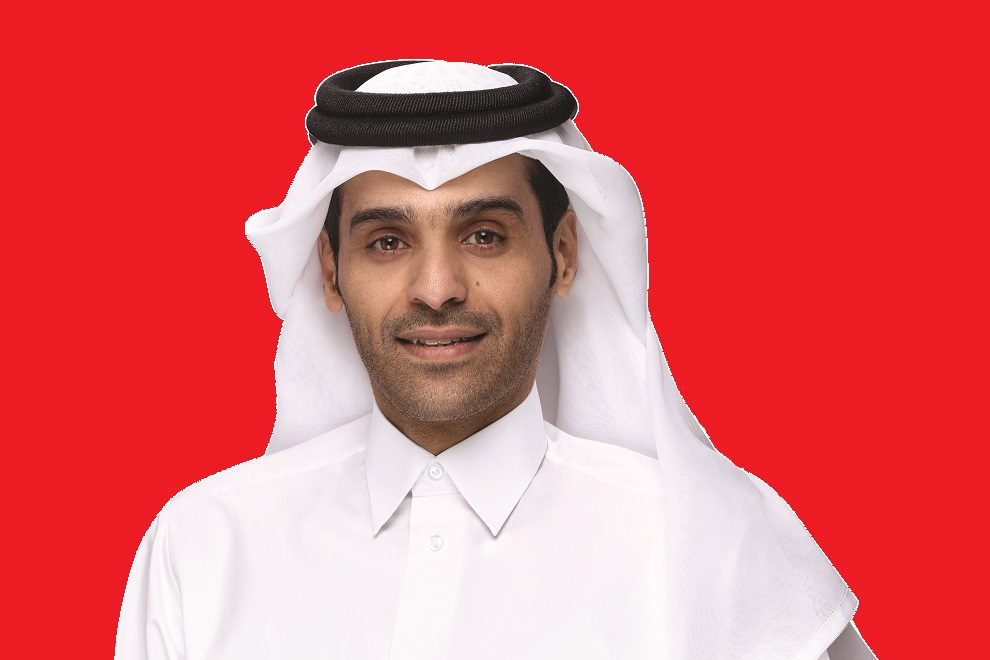Sheikh Mohammed Bin Abdulla Al Thani
Deputy Group CEO and CEO of Ooredoo Qatar
Gulraiz Khalid: Please give us the latest overview of the Ooredoo Group and its operations across the region.
Mohammed Al Thani: Ooredoo Group is a leading telecommunications company, headquartered in Doha, with operations in 10 markets in the Middle East, North Africa and Southeast Asia and a customer base of 121 million customers around the world.
Our vision is to enrich peoples’ digital lives, a core promise that took on a new level of relevance recently, as communities around the world faced unprecedented challenges with the COVID-19 pandemic and the subsequent global disruption.
As a leading operator and digital enabler, Ooredoo offers a vast range of world-class mobile, fixed, broadband, business, money and entertainment services. We are a preferred provider of digital services for our customers, offering robust networks upon which people and companies can rely. This was demonstrated as our networks provided a vital lifeline to ensure business continuity and remote productivity during the most difficult times of 2020.
At the regional level, we have a strong presence operating in Qatar, Kuwait, Oman, Iraq, Palestine, Algeria and Tunisia, and our companies are making great progress and achievements.
Most recently, Ooredoo Qatar transitioned towards becoming a truly digital player, enabling rapid time-to-market for new services and a seamless customer experience. Ooredoo Kuwait optimised its network and converted 2G and 3G networks to 4G to give more capacity to users and provided the highest 5G internet speeds in Kuwait, while Ooredoo Oman launched 5G services and provided 24/7 digital access and support for customers. Asiacell Iraq began deploying 4G infrastructure across the country in preparation for its launch in 2021 and Ooredoo Palestine continued to enhance and expand its network during the year.
Ooredoo Algeria successfully provided customers with innovative solutions and services in a very competitive market, including the launch of a new digital offer portfolio, while Ooredoo Tunisia solidified its position as the number one telecommunications operator by market share, network speed and customer service, retaining more than 43% of the total Tunisian mobile market.
GK: Would you like to describe the long-term objectives of Ooredoo Group?
MT: Looking back over 2020 and the challenges the world went through, I’m very proud to say that Ooredoo has done extremely well maintaining a stable financial position and demonstrating our ability and commitment to keeping everyone connected.
The lessons of 2020 helped inform our ongoing strategic review, sharpening the importance of focusing on our points of differentiation in an increasingly competitive telecommunications landscape and keeping pace with the progressive generational evolution of our underlying technology.
To continue Ooredoo’s positive momentum into 2021 and beyond, our strategy will focus on four main pillars, including Core, Digital, Infrastructure and Portfolio.
Our plan is to invest further in our people, our networks and our services to accelerate the performance of our Core business. This will enable us to lead our markets and maximise returns on our assets.
Which brings me to the second pillar: Digital. We’ve started our digital transformation journey a few years back, investing in our networks, in technology and in human capital – making it easier for our customers to find, buy and use our products online. We will continue with this exciting journey, building leading digital services and extending the implementation of digitalisation across the Group to be more efficient and agile. We’ve seen data traffic significantly rising across our footprint in 2020 and more customers are moving towards digital channels, which means Ooredoo is well on track to realise strong success from this strategy in 2021.
As for infrastructure, we are shifting towards a more asset-light financial model that will help us unlock significant capital and enable us to focus on our core mission of delivering outstanding digital services to our customer base.
We are also adopting a proactive portfolio strategy that will drive additional value across our markets. With our advanced and trusted networks in place, the horizon expands considerably, from the Internet of Things (IoT) to finding best-of-breed partners in the delivery of entertainment content. By orienting our work towards a customer base that takes mobile and specifically 5G for granted, we envisage operating with an increasingly diverse portfolio in the period ahead.
Financially, we remain focused on optimising CapEx by leveraging Ooredoo Group’s economies of scale. To this end, we have signed a strategic 5G agreement with global leader Ericsson for the supply of 5G equipment and related implementation and integration services.
Internally, we are ensuring our organisational culture is fast-moving, innovative and imaginative enough to stay ahead of the current demand curve. We continue to attract and retain talent from within our markets and we have seen, indeed, many young and emerging leaders step up and deliver during challenging times.
GK: How has the year 2021 been so far? As things start returning back to normal, how do you see this impacting business moving forward?
MT: Responding to these questions on what is loosely the first anniversary of the initial response to the global Coronavirus pandemic calls for sober reflection.
Going back to 2020, I am proud to say Ooredoo Group has reacted swiftly to the challenges presented by the pandemic, promptly implementing measures to support the communities we serve around the world.
This was hardly the result of last-minute planning. We have been investing in our networks, in technology and in human capital for several years, which enabled us to rapidly formulate response plans that helped our customers stay connected and easily adjust to a new way of life.
In the first three months of 2021, our emergency measures had been in place for quite some time across the organisation, meaning that we were well-versed in managing the risk to employees and customers from our activities in 2020.
At the same time, we’d realised the extent to which workplaces and households had been forced to change, and done our best to facilitate this. Specifically, this has meant securing the network to ensure that working from home and making heavy use of home learning and entertainment could proceed unimpeded.
In terms of a ‘new normal’, it is unclear to what extent some of these practices will outlive the pandemic as, for instance, some employees may continue with working from home from now on, but either way we are prepared.
GK: How is Ooredoo contributing towards the Digital Economy in the markets where it is operating?
MT: Forward-thinking governments are committed to various forms of modernisation, including the knowledge economy, and we are happy to partner with them towards such goals.
It’s a vision well-expressed in such programmes as the Qatar National Vision 2030, which will rely on a sound digital infrastructure to underpin them.
In Qatar, the company’s leadership in the business market was supported by the launch of several new products and services, including global connectivity services to support the Qatar Digital Economy by providing direct access to European data centres and IoT connect, and monitoring services to oversee all network connections in real time and track water and energy usage. The company also launched Quad Play, Business EDGE and vehicle tracking services.
Asiacell Iraq is a key enabler of Iraq’s digital economy, providing a world-class network and infrastructure to connect local businesses to the global economy.
Concurrently, we are learning what works best in particular national markets and building on this best practice.
While, say, Oman, Indonesia and Palestine are all very different marketplaces, what ties them together is a strong sense of the potential benefits of a digital economy. This can start simply, with something like being able to distribute remittances safely and inexpensively through our mobile money services, but over time we would encourage people to dream big – imagine, for instance, if a nation’s haulage needs could be met by IoT/AI-based fleet management of a multitude of driverless electric vehicles.
GK: What are your plans with regards to deploying more 5G across your global footprint? And what is the current situation with 5G adoptability in Qatar?
MT: I am delighted to say that we’re now providing 5G services in Qatar, Kuwait and Oman. We’re also deploying 5G infrastructure in Indonesia and have completed the commercial launch of 5G services by Ooredoo Maldives in December 2020.
In Qatar, the first country in the world to have launched 5G commercially through Ooredoo, we did not let the unprecedented conditions of 2020 steer our digital vision off course; instead, the company remained committed to its digital transformation strategy despite the challenges, further expanding its 5G network and enhancing its product offering.
A major milestone in 2020 was Ooredoo Qatar, working with technology giant Ericsson, successfully testing the 200MHz spectrum and achieving a record system throughput of 4.2Gbps, as part of the development and expansion of the 5G network. The technology, deployed within Ooredoo’s network, uses advanced 5G and 4G carrier aggregation functionality, increasing the data rate per user by assigning multiple frequency blocks to the same user.
By the end of 2020, Ooredoo Qatar’s 5G coverage extended to 93% of the population. Moving forward, 5G and its myriad use cases will remain a key driver of the company’s ongoing success, as it adopts the latest technologies to become a truly digital player.
GK: What will be the key focus of Ooredoo Group moving forward? Which markets do you expect to bring about the highest growth?
MT: We will continue the momentum in the shift to digital channels for service provision, evaluating ways in which we can further enhance options for our customers to engage with us digitally and rolling out new and improved channels where needed.
In 2021 and beyond, our Group strategy will remain focused on digital transformation, making it easier for customers to find, buy and use our products and services online. Customers across our footprint can rely on us to provide them with the most relevant digital services that meet their daily personal and business needs.
In terms of offerings, we are always working on new and enhanced mobile apps that offer great features, which will enable our customers to buy, manage and use our services easily, with just a few clicks. Our entertainment offerings will be further expanded to include world-class premium content streaming and gaming options.
Ooredoo’s rich portfolio of mobile apps now includes as well financial services, an area on which we are increasingly focusing, in response to the growing need for such provisions across our footprint.
As for our business customers in particular, the development of Internet of Things apps and solutions will be a priority especially that our groundbreaking 5G networks are being rolled out in new markets.












